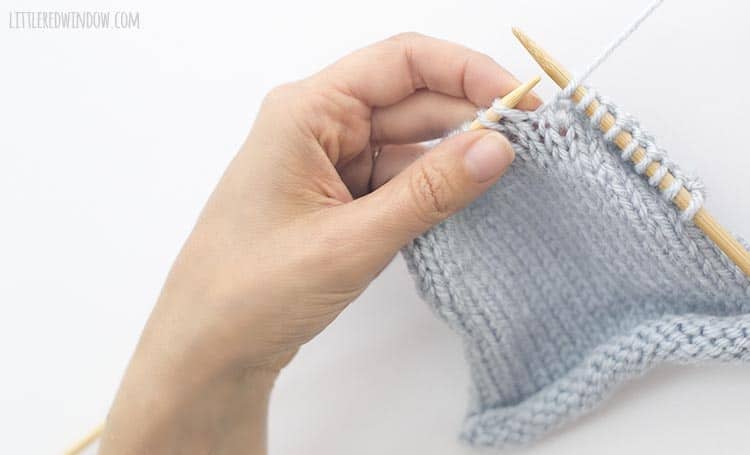
Counting rows in knitting is crucial. This will make it easier for you to keep track of the number and type of stitches that have been made. You have a variety of options depending on your type of knitting. Some are very simple while others are more complex. These counters may be electronic or manual and can be worn, or placed on a sewing machine.
Electronic counters can store the row count in memory, which is a big advantage over mechanical counters. They are attached to a wristband or ribbon and look similar to a stopwatch. The majority of electronic row counters will require batteries. If the counter is not turned on, it will stop counting rows. Some row counters have a button you can press to add to the total. Some can be shut down but electronic row counters need to remain on the whole time.
You want a durable, compact and user-friendly row counter when knitting. You will also want one that is suitable for your hand size. A smaller row counter is better suited for those with small hands. Some row counters can be attached to the needle to allow you to count your stitches quickly and easily. A large counter may not work well if you have a large hands.

Knitter’s Pride row counter ring can be used on thumbs and index fingers. It's made of stainless steel and comes in six sizes. It can count up to 9999 rows. This row counter also comes in rainbow colours. You can use the counter to count any needle size or type.
Knitter’s Pride row counters can be used for straight, circular and double-pointed stitches. You can count the number of stitches you've worked in any row, and the counter will increase in number for each consecutive row. You can count up 9999 rows before the counter resets itself to zero. You can also use it as a counter to mark how many stitches are in a given pattern.
Kacha-Kacha row counters are larger than needle barrel row counters. They can be attached to a neckband, or threaded onto jewelry. To advance the counter, you can either move the button at the top or manually. When the counters move, they make a kachakacha sound. You can reset them easily. Kacha-Kacha counters often come with a lock. This is helpful if you fear damaging the device. The lock prevents unauthorized tampering with the counter.
Many knitting stitch counters are rated based on durability. If you are worried about losing your counter, you may want to buy a stainless steel one. These counters can last a long time and are highly recommended for those who count their stitches over a longer period.

No matter whether you're using an electronic row counter or a mechanical one, it is important to find the right one for you. Some electronic row counters look like a wristwatch, while others are more sophisticated. A row counter that fits comfortably in your hand makes it easy to count rows and reduces the chance of you forgetting it.
FAQ
What are some good hobbies?
Hobby Ideas for People who Love to Learn and Teach Others.
Hobbies can be a great way to have fun and learn something new.
There are many different types of hobbies, but they all have similar characteristics. They are usually enjoyable activities that don't require a lot of effort and can be very economical.
They also tend to involve working with others, whether teaching someone how to play an instrument or helping them build a model airplane.
While you may not see yourself as a teacher at first, chances are that there is something you could do for someone else.
Consider starting a hobby to use your creativity to help others.
What are some hobbies that would suit introverts?
Introverts can concentrate on one thing at the same time. They prefer solitude, such as reading, writing music, or watching movies.
They also love to spend quiet time by themselves. However, they do not enjoy socializing all day long. In fact, they can often be bored when surrounded with people.
Introverts are often drawn to hobbies that require solitude. You might find them reading books, listening, playing music, taking photos, writing poetry or painting.
Some introverts prefer to live alone. This allows them to focus on their hobby without being distracted by other things.
How can I find a hobby?
You may feel overwhelmed when you start your quest to find a hobby.
You're probably thinking, "I'm not very artistic," or "I'm terrible at sports," or maybe even "I don't know anything."
However, it is likely that you already have a lot to draw on when searching for a hobby.
It's simply that you haven’t yet realized it.
Take a tour of your house. Do you have a lot of stuff?
Do you have any old toys lying around that could be used?
Perhaps you have a collection books or magazines.
Perhaps you've always wanted a career in cooking.
Or perhaps you would just like to learn how to play the guitar again.
It doesn't matter what it is, you can probably turn it into a hobby.
The key is to see that you already have many experience to draw upon.
And once you do, you'll be able to pick out a hobby that fits right into your lifestyle.
What are observation hobbies exactly?
Observation hobbies are those activities that allow you to watch others do what they do. They might include watching sports, reading books, going on holiday, etc. It could also involve observing others.
Observation hobbies are great because they help you learn how to think creatively. You can draw on this knowledge later, when you work on projects for others.
It will be easier to learn about something if you are interested in it.
If you are interested in learning more about football, for example, you might watch a match or read a book. Visit or take photographs to learn more about the art of photography.
You can play along with songs online or purchase a guitar if you love music.
If you like cooking, you could cook your own meals or visit restaurants.
If gardening interests you, you could plant vegetables or flowers.
If you are a fan of dancing, you can join a class or go out with your friends to learn.
You can paint pictures if your passion is painting.
If you like writing, you could write stories or poems.
You might enjoy drawing pictures, if you are a good artist.
If you're passionate about animals you might consider working at a Zoo or looking after their pets.
If you enjoy science, you might consider studying biology, chemistry and physics.
History is something you might enjoy if you read books, watch movies, or listen to podcasts.
You could explore the world or travel to places you love if you are a lover of traveling.
What are educational hobbies?
An educational hobby can be defined as an activity in which you learn something through doing it. This could be anything you want, such as playing sports or learning how to play an instruments.
It should be enjoyable and fun for you. It doesn't have to be done all the time. However, if you get bored of it, you should think about other things you can do instead.
Also, you need to be careful not to spend too much on these activities. They can end up costing more than you think.
What are some great hobbies?
Your favorite hobbies are ones you enjoy. If you enjoy what you do, it will be much easier to keep going. You will have a reason when you feel sick or tired.
The hobbies we all love are gardening, painting and crafting, photography.
Consider volunteering at your local animal shelter, charity shop, hospice, children's hospital or hospice, elderly care home, school center, church, or community center.
If you're looking to do something more adventurous, Why not take up scuba diving, rock climbing, sky diving, bungee jumping, white water rafting, sailing, surfing, canoeing, kayaking, horse riding, zip lining, hang gliding, paragliding, skydiving, snowboarding, skiing, mountain biking, hiking, camping, fishing, hunting, archery, shooting, clay pigeon shooting, target shooting, golf, tennis, swimming, snorkeling, windsurfing, waterskiing, kitesurfing, wakeboarding, standup paddle boarding, hang gliding, parasailing, hot air ballooning, paragliding and many more.
There are many unique ways to spend time in the outdoors, whether you're looking for adventure or a more traditional way to do it. You can go cliff diving, cave tubing or snowshoe hiking, snowshoeing or snowkiting.
What is the cost of a hobby?
Time is all that's required to make a hobby a success. It can take many years to accomplish what you desire if you are serious about it.
But there is one thing that can help you. It's called "passion". If you have passion about something, it will make it easier for you to work hard.
You may become addicted to the activity once you have put in enough hours. This is where the real fun begins. Because you now enjoy what you do and are improving your skills every day. You will likely have seen a significant improvement by the end the year.
So don't worry too much about how long it takes. Just go ahead and try. You may be surprised.
Statistics
- Almost 80% of people claim to have no hobby. (hobbylark.com)
- I am 100% biologically a woman (discover.hubpages.com)
- 37% Video Games 36% Travel 36% Health and Fitness (quizexpo.com)
- The Role of the Mind in Sex, Dating, and Love: Men in the “humor” condition received phone numbers from 42.9% of the female participants and were refused 57.1% of the time. (time.com)
- The intensity of the dialogue partners' bond at the end of the forty-five-minute vulnerability interaction was rated as closer than the closest relationship in the lives of 30 percent of similar students. (time.com)
External Links
How To
How to Find the Right Hobby
Ask yourself some questions to find out if your hobby is right.
-
Do I enjoy doing it?
-
It gives me pleasure?
-
Is this something I'd like to do even as I age?
-
Do I have any skills?
-
Do I have any ideas?
-
Would I recommend it?
-
Is it going to bring me happiness?
-
Can it help me to relax
-
It will make me feel better about my self?
-
Can it help me to develop skills that I can apply later in my life?
-
Can it help me make new friends?
-
Will it allow me to express my creativity?
-
Is it possible to learn new skills?
-
Is it going give me confidence?
-
It will give me a feeling of achievement.
-
Is it possible to achieve financial success?
-
It will allow me to travel.
-
Will it allow me to explore new places?
-
It will encourage me to exercise.
-
Will it encourage me to work harder and do I feel inspired?
-
Can it motivate me and help me succeed?
-
Are there activities I might not consider doing?
-
Is it going to challenge me?
-
Will it be exciting?
-
Will it keep me fit?
-
Can it save money?
-
Can it lower stress levels
-
Will it prevent boredom?
-
Is it possible to save my time?